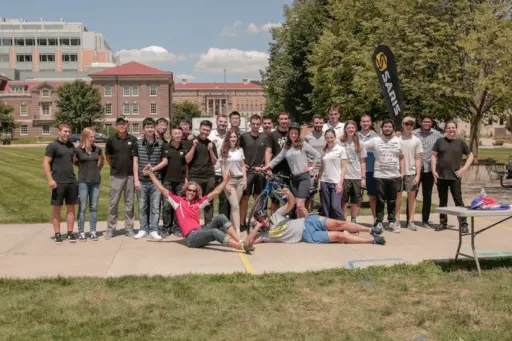The thrill of victory. The agony of defeat. Sunny Wisconsin morning air charged with the spirit of international competition.
Electrically charged, that is. On July 31, 2019, the University of Wisconsin-Madison College of Engineering hosted students from around the world for the 2019 International Future Energy Challenge.
In order to win, teams needed to mount an electric drive they built onto the frame of a blue Trek bicycle and then complete a relay-style race, with each member of the group pedaling two loops around the track—otherwise known as the sidewalk surrounding an engineering campus landmark known as the Descendants Fountain.
The winning team in the race, NoRocketScience from Baden-Württemberg Cooperative State University in Stuttgart, Germany, finished their circuits a full 15 seconds faster than the second-place finishers, team H-Bridges from the University of Belgrade in Serbia. But H-Bridges won the Grand Award of the Challenge, which included various other performance metrics besides speed.
 Student teams from around the world in the 2019 International Future Energy Challenge as well as committee technical chair Kyle Hanson (seated, center left).
Student teams from around the world in the 2019 International Future Energy Challenge as well as committee technical chair Kyle Hanson (seated, center left).
Designed to spark interest in power electronics, particularly for technologies that promote conservation or effective use of electrical energy, the International Future Energy Challenge has been encouraging students to draw upon their creativity and perseverance to create innovative solutions for real-world problems since its inception in 2001.
But the 2019 competition required a little extra ingenuity.
“This is the first year that the students have been asked to create a moving drive,” says Giri Venkataramanan, a UW-Madison professor of electrical and computer engineering and general chair of the competition committee for 2019.
Venkataramanan, who is associate director of the world-renowned Wisconsin Electric Machines and Power Electronics Consortium, knew that an electric drive bike would be the perfect challenge when UW-Madison was selected to host the 2019 contest.
“Madison has such a strong cycling culture,” he says. “We also wanted to set a challenge that would add visibility to the competition, and transportation is an important problem.”
The challenge drew 23 teams to enter when it was announced in late 2018, hailing from such far-flung locations as China, Germany, Ireland, India and the United Arab Emirates. From that crowded field, 10 teams emerged with design specifications that passed technical muster, earning them a trip to Madison for the final race.
In the week before the final trial, the teams holed up in the makerspace on the UW-Madison campus nearly non-stop to put the final finishing touches on their drives. During that week, incoming freshman students in the department of electrical and computer engineering’s summer bridge program (a monthlong on-campus experience designed to give undergraduates a “jump start” on their degrees) shadowed the teams.
In the end, only four groups made it to the starting line.
And it was touch-and-go for some. Team Aggie-E-Bike, of Utah State University, experienced a catastrophic short-circuit the night before the race.
“We saw sparks and smoke and the current burned a hole right through our main board,” says Kevin Killian, a mechanical engineering major at Utah State University. “We were up until 1 in the morning rebuilding our drive.”
That perseverance paid off, though. Even though they didn’t win, the team got the drive working again and completed its required laps around the fountain with a respectable time of just over four minutes.
The race didn’t go quite so smoothly for the team from National Ilan University in Taiwain. A tight turn at one of the race track’s tight corners sent a rider sailing off his saddle, and the crash knocked the battery pack loose from its mounts on the bike’s frame.
Luckily, he was wearing a helmet, and suffered no major injuries. And the team was able to re-mount its motor drive to complete the relay.
At the end of the day, despite intense competition, the teams happily posed for photos together, holding up their own national flags, as well as those of their competitors. As the contest wound down, students pedaled around on commercial electric drive-bikes from Trek (a competition sponsor), occasionally performing wheelies and other tricks.
The winning team took home a grand prize of $10,000, but all the competitors left Madison with some new international friends and a well-earned sense of accomplishment for finishing the contest, regardless of how fast their bike actually went.
“it’s the first time any of us has built an e-bike,” says Killian. “That means the race is automatically a personal best.”
Check out photos from the day’s events in the slideshow: